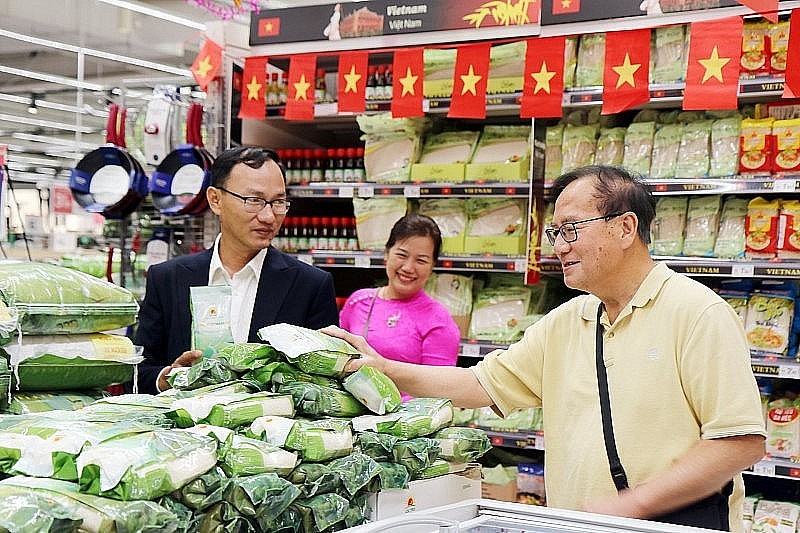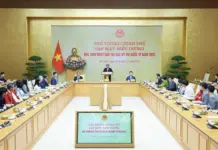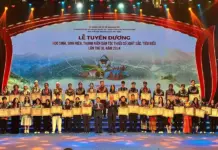 |
| Vietnamese rice sold in French supermarkets (Photo: Loc Troi Group). |
The Vietnam SPS Office, in collaboration with the Ca Mau Provincial Department of Agriculture and Rural Development, organized a conference to disseminate the regulations and commitments outlined in the Sanitary and Phytosanitary (SPS) provisions of the EU-Vietnam Free Trade Agreement (EVFTA).
Ngo Xuan Nam, deputy director of the SPS Vietnam Office, said that Vietnam joined the World Trade Organization (WTO) more than 16 years ago and has since signed 19 free trade agreements (FTAs) and 16 other agreements. Many of these agreements are considered new-generation trade agreements.
After signing these agreements, Vietnamese agro-forestry-fishery exports to EU member states have been promoted. For many years, the country’s export value has consistently reached significant milestones, especially in the past two years, with export values exceeding USD 50 billion. It is expected to exceed USD 54 billion this year.
In particular, the EVFTA has facilitated two-way agricultural exports between Vietnam and EU countries since August 2020.
Notably, major commodity industries such as seafood, rice, fruit, and some food products have seen increased exports to the EU market. In contrast, Vietnam has also imported a number of products originating from animals and plants from the EU market.
From January to October 2023, EU members have issued 103 notifications and draft opinions on safety measures for food safety, animal health, and plant health. This demonstrates a comprehensive regulatory framework aimed at ensuring the integrity and safety of agricultural and food products imported into the EU market.
According to Nam, there have been no warnings about pesticide residues in any shipments of Vietnamese rice exported to the EU in the past two years. He stated that the quality of Vietnamese rice fully meets the requirements of this demanding market. The EU market is known for its high standards, and Vietnam is able to meet them.
According to statistics released by the General Department of Customs, Vietnamese rice export turnover reached 7.1 million tonnes with a value of USD 3.46 billion last year, an increase of 13.8% in volume and 5.1% in turnover compared to 2021. The average export price stood at USD 486.2 per tonne, down 7.7% compared to the average level in 2021.
Although it only accounts for 2.45% of total exports, the European market has experienced strong growth of up to 90.7% compared to 2021, reaching 172,200 tonnes.
In the first half of the year, rice exports to several markets in the EU grew at three-digit rates, such as Poland with a 117% increase, Belgium with a 165% increase, and Spain with a 308% increase.
The average price of rice throughout this period was estimated at USD 539 per tonne, up 10% from the same period last year. However, rice exports to the EU often saw prices much higher than this average.
Ngo Xuan Nam believes that the EU market is a potential export market for many types of Vietnamese agro-forestry-fishery products, thanks to its market size of over 500 million people and the growing consumer demand for agricultural and food products. Additionally, the EVFTA includes commitments to reduce most tariffs in a short timeframe.
However, the EU market is known for its strict animal and plant quarantine regulations and stringent control, especially for agro-forestry-fishery products. Experts predict that the EU market will increase technical barriers while reducing tariff barriers.
In addition to government regulations, the EU market also offers numerous standards and certifications from consumer associations, non-governmental organizations, and retailers. Businesses that want to export to the EU must comply with global standards on food safety requirements.
European businesses pin hope on EVFTA
The European Parliament has ratified the EU-Vietnam Free Trade Agreement (EVFTA) and the EU-Vietnam Investment Protection Agreement (EVIPA). The ratification is believed to create a breakthrough in trade investment cooperation between European firms and Vietnamese partners after the deals take effect.
EVFTA poses challenges to Vietnamese agricultural products
Since the EVTFA was approved, experts have been analysing the opportunities for Vietnam to penetrate deeper into the high-value foreign markets. However, the implementation of the deal also poses many challenges to Vietnamese agricultural products. Besides strict standards from the European Union market, competitive pressure in the domestic market is also a big issue.
Vietnam Seizes Opportunities from EU Trade Deal for Tourism Growth
The EU-Vietnam Free Trade Agreement (EVFTA) is expected to offer opportunities for various economic sectors, including tourism. The new-generation trade deal expected to take effect this year will enable the domestic tourism sector to access new markets, restructure the market and promote sustainable development in the context of complicated global changes.








